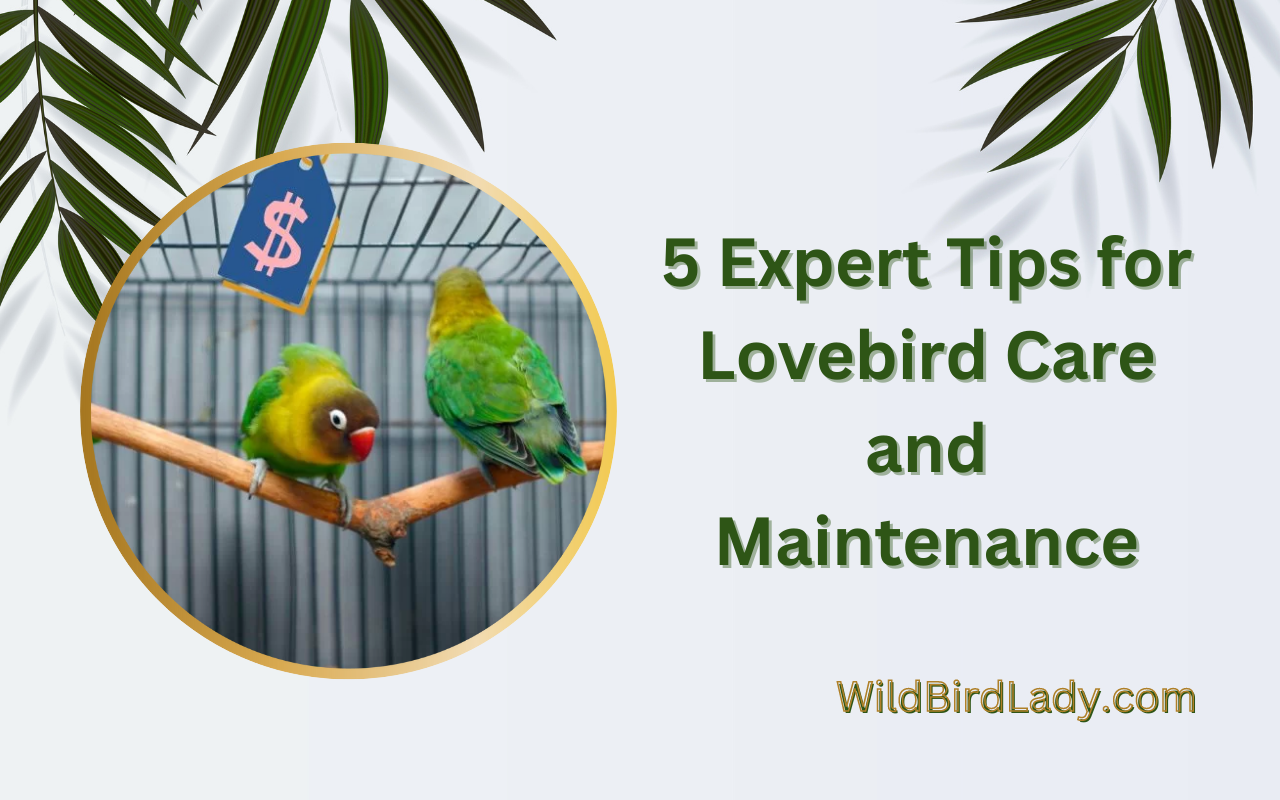Lovebirds need proper care to stay healthy and happy. Here are five essential tips to help you care for your feathered friends: Observe their body language, Listen to their vocalizations, Spend time together, Providing Essential Toys And Accessories, Offer swings, ladders, and mirrors.
Lovebirds are small and colorful birds that are popular pets due to their affectionate nature and playful behavior. However, caring for a lovebird requires much more than just feeding and watering them. From providing a suitable living environment to ensuring they receive adequate nutrition and medical care, keeping lovebirds healthy and happy takes effort and commitment.
In this article, we’ll provide you with five tips on how to properly care for your lovebirds. Whether you’re a new or experienced bird owner, these tips will help you provide your lovebirds with the best possible care at home.
Understanding Lovebirds
Lovebirds are among the most sought-after birds in the pet trade for their vibrant colors and affectionate personalities. As with any pet, providing them with proper care and maintenance is crucial to their well-being. Understanding their behavior and communication is the first step in building a strong bond with these charming birds.
Here are some expert tips to help you care for your lovebirds.
Different Species Of Lovebirds
Lovebirds are native to africa and madagascar and are classified into nine different species. Each species has its unique coloration, size, and personality. Some of the popular species include:
- Peach-faced lovebirds: These are the most common lovebirds that have gained popularity among bird enthusiasts in the pet trade. They have bright green feathers and a peach-colored face.
- Masked lovebirds: These are small-sized birds with a distinctive black mask around their eyes and a green body.
- Fischer’s lovebirds: These birds have a striking combination of green, yellow, and orange-colored feathers.
- Black-cheeked lovebirds: These lovebirds have a green body with a black head and neck.
Understanding Their Behavior And Communication
Lovebirds are social birds that thrive on companionship. They are intelligent and can display a range of emotions, including joy, sadness, and anger. Understanding their behavior and communication is essential to building trust and a strong bond with them. Here are some tips:
- Observe their body language: Lovebirds use their body language to communicate their emotions. For example, fluffing their feathers indicates that they are relaxed, while rapid fluttering of their wings indicates excitement.
- Listen to their vocalizations: Lovebirds are noisy birds that use vocalizations to communicate with each other. They make various noises, including chirping, whistling, and screeching, to express their emotions.
- Spend time together: Spending quality time with your lovebirds is essential to building a strong bond with them. You can play games, offer them treats, or simply enjoy each other’s company.
Understanding the different species of lovebirds and their behavior and communication is crucial to providing them with the care and attention they need. By following these expert tips, you can ensure that your lovebirds lead a happy and healthy life.
Creating A Comfortable Habitat
Choosing The Right Cage And Location
The first step to creating a comfortable habitat for your lovebirds is choosing the right cage and location in your home. Here are a few things to consider:
- Choose a cage that is spacious enough for your lovebirds to move around and spread their wings. A good rule of thumb is to select a cage that is at least 2 feet wide, 2 feet tall, and 1 foot deep.
- Make sure the cage has enough horizontal bars so your lovebirds can climb and perch comfortably. Additionally, select a cage with strong metal bars to prevent any escape attempts.
- Pick a location for the cage which is not directly exposed to sunlight or drafts. Ensure that the cage is placed in an area where your lovebirds can interact with people, but not in an area that is too noisy or stressful for them.
Providing Essential Toys And Accessories
Lovebirds are very active birds that need a variety of toys and accessories to keep them entertained and happy. Here are some essentials:
- Provide a variety of perches at different heights and in different textures, such as wood, rope, or plastic.
- Offer swings, ladders, and mirrors to allow your lovebirds an opportunity to explore and play.
- Supply your lovebirds with foraging toys and puzzles, as they love to explore and search for their food.
- You may also consider providing a birdbath so your lovebirds can clean themselves.
Importance Of Cleanliness
Another important aspect to consider when creating a comfortable habitat for your lovebirds is the cleanliness of their cage. Here are a few tips:
- Clean the cage at least once a week with warm, soapy water and rinse well.
- Replace the bedding at least once per week, and more often if it becomes soiled or wet.
- Provide fresh water in a clean bowl daily.
- Remove any uneaten food or debris from the cage as soon as possible to maintain a clean and healthy environment for your lovebirds.
By following these expert tips, you can create a comfortable and happy home for your lovebirds. Remember to always provide enough space, toys, and proper care to keep your feathered friends healthy and content.
Feeding Lovebirds
As a lovebird owner, it’s important to know what and how much to feed these lovely birds to keep them healthy and content. Here are some tips to help you with your lovebird’s dietary needs.
Understanding Their Dietary Needs
Lovebirds have a well-earned reputation for being ‘fussy eaters,’ but despite their pickiness, they do require a diverse and well-rounded diet. Their typical diet should be made up of:
- High quality, pelleted food that is specifically formulated for lovebirds
- Fresh fruits and vegetables, like apples, bananas, and broccoli
- Small amounts of seeds as treats
Lovebirds require a consistent diet, so ensure to establish a feeding schedule that is convenient for both you and your bird.
Selection Of Appropriate Food
There is an assortment of lovebird-specific food available in the market, each designed to meet their nutritional needs, and it’s essential to choose high-quality bird food in your local pet store. Avoid feeding your lovebird only seeds as the sole source of nutrition because it will not provide the necessary healthy balance in their diet.
Other must-dos:
- Don’t feed your birds any foods that are toxic to them, such as chocolate, avocado, and caffeine.
- Keep fresh food and water in their cage at all times.
Healthy Treat Options
Lovebirds enjoy treat occasionally, but it’s crucial to pick healthy options that won’t harm their health. Some of the best treat options include:
- Flax seeds or cuttlebones as calcium-rich alternatives
- Fresh, low-sugar fruits like berries or papaya can provide a healthy boost of vitamins and minerals
- Dark, leafy greens help to bulk up your bird’s diet
By following these simple feeding guidelines, you’ll be confident that your lovebirds will remain healthy and satisfied. Happy lovebird feeding!
Health And Wellness
Lovebirds are fascinating creatures with unique personalities and behaviors. One of the most important aspects of owning a lovebird is taking care of their health and wellness. To keep your pet bird in tip-top shape, here are five expert tips on lovebird care and maintenance, with a specific focus on health and wellness.
Common Health Problems In Lovebirds
Like all living creatures, lovebirds can develop health issues. Some of the most common health problems in lovebirds include:
- Respiratory infections
- Feather plucking
- Psittacosis (also known as parrot fever)
- Egg binding
- Malnutrition
It’s important to keep an eye out for any signs of illness in your lovebird, including changes in behavior, loss of appetite, or visible symptoms such as discharge from the eyes or nose. If you suspect that your lovebird is sick, it’s essential to take them to a veterinarian as soon as possible.
Regular Checkups And Veterinary Care
Just like humans, lovebirds also require regular checkups and veterinary care to maintain their health. It’s recommended to take your lovebird to see a qualified avian veterinarian at least once a year for a routine checkup. During these checkups, the vet may perform a physical examination, blood work, and other tests to ensure your lovebird is healthy.
In addition to annual checkups, it’s also essential to take your lovebird to see a vet if you notice any signs of illness or if your lovebird is due for vaccinations or other treatments.
Importance Of Exercise And Mental Stimulation
Lovebirds are active creatures and require plenty of exercise and mental stimulation to stay healthy. Encourage your lovebird to exercise by providing plenty of opportunities for playtime and physical activity. Consider placing toys and perches in your bird’s cage to encourage movement, and allow your lovebird to fly outside of the cage if possible.
Mental stimulation is also important for lovebirds. Like all intelligent animals, lovebirds require mental stimulation to stay happy and healthy. Give your lovebird plenty of opportunities to interact with their environment by providing toys, puzzles, and other interactive items.
With proper care and maintenance, lovebirds can live long, healthy, and happy lives. By focusing on your bird’s health and wellness, you’ll be able to enjoy many joyful years with your beloved pet.
Socialization And Training
Lovebirds are a popular choice for many bird enthusiasts as they are small, colorful, and full of personality. They are also known for forming strong bonds with their owners. However, taking care of lovebirds requires a lot of effort and knowledge.
We will provide you with 5 expert tips for lovebird care and maintenance. Let’s explore the importance of bonding with your lovebirds, methods for socialization and training, and tips for dealing with aggressive behaviors.
The Importance of Bonding With Your Lovebirds
Birds are intelligent creatures, and lovebirds are no exception as they have a reputation for being very social and affectionate. Bonding with your lovebirds is important as it promotes a sense of trust and security and helps them adapt to their new environment.
Here are a few ways to bond with your lovebirds:
- Spend time with your lovebirds every day by holding them, talking to them, and offering them treats.
- Be consistent with your interactions, as this will build their trust in you over time.
- Provide your lovebirds with a comfortable living environment, including enough space to spread their wings and plenty of toys and perches for exercise.
Methods For Socialization And Training
Socializing and training lovebirds is crucial as they can develop behavioral issues if not appropriately trained. Start training your lovebirds when they are still young, as they are more receptive to learning. Here are a few training methods to consider:
- Clicker training is an effective way to train lovebirds as they will associate the sound of the clicker with a reward, such as treats or verbal praise.
- Target training is another fun training technique where you use a target stick to guide your bird to do specific actions like stepping up, turning around, and even performing tricks.
- Another important aspect of socialization is introducing your lovebirds to different people, pets, and environments. This will help them become more comfortable outside of their cage and be less prone to aggressive or territorial behavior.
Dealing With Aggression Or Behavioral Issues
Aggression and behavioral issues are common among lovebirds, but they can be managed with proper training and socialization. Here are some tips to deal with aggression:
- Identify the cause of aggression, such as territorial behavior or fear.
- Use positive reinforcement to encourage good behavior, such as rewarding your bird when they stop squawking or biting.
- Be gentle but firm when disciplining your bird. Avoid being too rough or punishing them.
- Seek professional help if the aggression or behaviors continue despite your training efforts. A veterinarian or a certified bird behaviorist can help you address your lovebird’s issues.
Lovebirds are great pets, but they require a lot of care and attention. Bonding with your lovebirds, socializing, and training them are crucial for their overall well-being. And remember, it’s not uncommon for birds to display undesirable behaviors, but with patience and persistence, you can manage and correct these behaviors.
Frequently Asked Questions
How Long Do Lovebirds Live As Pets?
Lovebirds can live for 10 to 15 years if they receive proper care and attention.
What Should I Feed My Lovebirds?
A balanced and nutritious diet for lovebirds consists of fresh fruits, vegetables, pellets, and seeds.
How Do I Keep My Lovebirds Happy?
Lovebirds need plenty of socialization, mental stimulation, and exercise to maintain good physical and mental health.
How Often Do Lovebirds Need To Be Groomed?
Lovebirds should be groomed regularly to keep their feathers and beaks healthy. This can be done monthly.
Do Lovebirds Make Good Pets For Children?
Lovebirds can make great pets for children with adult supervision. Children should be taught how to handle them gently and properly.
Why Do Lovebirds Need A Companion?
Lovebirds are social birds and thrive in the company of other lovebirds. A companion can prevent loneliness and provide mental stimulation.
Conclusion
To sum up, taking care of lovebirds is not an easy task, but if done with dedication and commitment, it can be a very rewarding experience. As seen in these 5 tips, it is crucial to provide a healthy and comfortable environment, a nutritious diet, socialization, and regular vet checkups.
By following these guidelines, lovebirds will thrive under your care, and their beautiful chirps and melodious music will fill your home with joy and happiness. Show your love and care by providing them with an abundance of attention, patience, and affection.
Remember, lovebirds are intelligent and sensitive creatures with unique personalities, they deserve the best care possible. Implementing these tips will go a long way in ensuring their physical and emotional wellness for years to come.
Published on April 29, 2023 | Last Updated on June 28, 2025 by Rifat Ahmed
Latest Posts
How Long Do Cardinals Live? Discover the Secrets Behind Their Lifespan
By Rifat Ahmed – Birdwatcher with 13+ Years of Experience There’s something magical about the flash of red that flits across a winter landscape. The Northern Cardinal, with its brilliant...
Baby Blue Jays: Life Stages, Care Tips, and What to Do If You Find One Alone
As a birdwatching enthusiast for over 13 years, I’ve had the privilege of observing blue jays in every stage of life. From the moment they hatch until they take their first flight, baby blue jays...


:strip_icc()/507277010_ebda0b3720_o-5c38cc63c9e77c0001f83db7.jpg)
